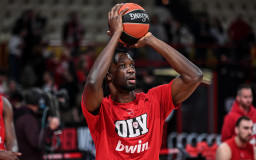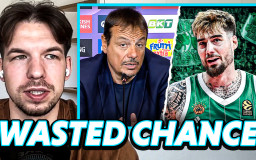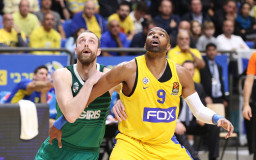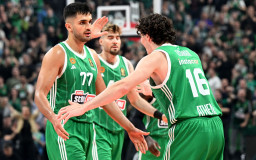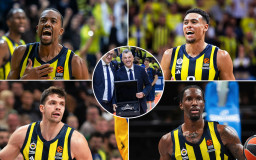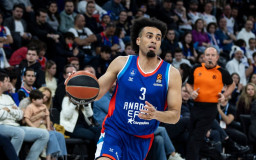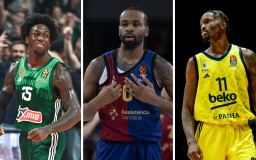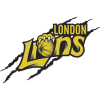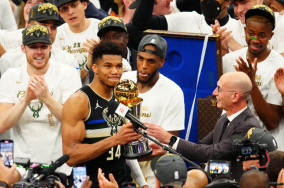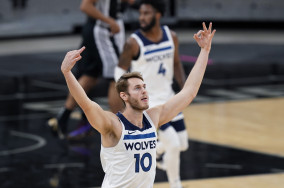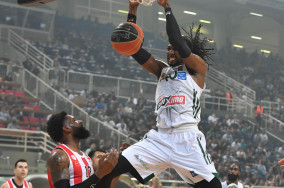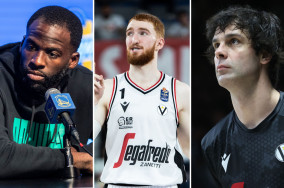London Lions ended an 18-year British basketball drought in the EuroCup bringing back memories of Nick Nurse's adventure in Great Britain.
The London Lions became the first British team to register the EuroCup win since Nick Nurse's Brighton Bears in 2004.
Even without two star signings, Kosta Koufos and Sam Dekker, Lions defeated Dolomiti Energia Trento 80-75 and bounced back from the loss in Round 1.
Eighteen years ago, orchestrated by the future NBA champion with the Toronto Raptors, Bears defeated Cholet Basket from France behind Randy Duck's 49-point performance.
To this day, Randy Duck holds EuroCup's single-game scoring record.
The newly emerged London Lions project brings excitement and new hope to find life in London, which is one of the most important markets for the potential growth of the EuroLeague.
British basketball had to go through a lot to be on the European basketball map again, and how it has changed since the last victory in the EuroCup competition.
It all goes through Nick Nurse's eyes, who shared his British basketball experience in his biography: "Rapture: Fifteen Teams, Four Countries, One NBA Championship, and How to Find a Way to Win - Damn Near Anywhere."
BasketNews shares the most adventurous moments from Nurse's journey in British basketball.
He worked in Derby Rams (player-coach, 1990-91), Birmingham Bullets (1995-97), Manchester Giants (1998-00), London Towers (2000-01), and Brighton Bears (2001-06).
The beginnings
I received a letter from the owner of a team in Derby, England, a place I'd never heard of, saying they would like me to play point guard for them. That same day, the team's owner, a man named Tim Rudge, reached me by phone to tell me that in addition to playing, he wanted me to be the head coach. Later, he would let me know he also expected me to score twenty points a game.
Strange requirement in Derby
We were required to drink in a local pub with fans after home games. Normally, the coach would drive the team van to away games, but I was too young to legally operate a vehicle of that size, so I sat beside our center, a nice guy named Martin Ford, as he drove.
Salaries
The league was marketing itself as family-friendly entertainment - a sport that avoids "The hooliganism that blights soccer," as the New York Times put it. Tickets were affordable, and the league was getting some television viewership after signing a contract with Sky TV. Players still were not paid much.
Each team had a salary cap of something like $100,000 - less than a couple of the NBA's top stars that, at that point, made for a single game. My salary was about $300 a week, plus an apartment and a car.
I didn't care very much. I was still only 27 years old, though, at six years into my career, I wasn't a rookie coach anymore. But if I had been driven by money, I would have already used my accounting degree to get a proper job or figured out some other way to make a living.
"You're free to go"
Manchester, which I coached for two seasons, from 1998 to 2000, was the most well-funded team in the British Basketball League. <...> Some fans are considered in the evil empire, like the New York Yankees.
They paid more than anybody else and had beautiful accommodations for the American players they brought over. <...> The franchise was run very professionally, and they were a north above the rest of the league in every way but one: they almost never won anything. <...>
<...> After chasing a championship with a lot of money for years, they finally succeeded. That night, we were celebrating down in Wembley like you always do when you win a championship in England.
And the owners gathered us together and took us across the street to a hotel lobby - the coaches, team executives, and employees, a whole bunch of folks. They gave us an extra $20,000 bonus and said, "We're selling the team. You're all free to go. It's over."
Part-ownership experience
<...> I joined the Brighton Bears as both the coach and part-owner. Very quickly after that, my partner made clear he had better things to do than run the team day-to-day. Like a dumbass, I agreed to take on that role and also become the sole owner.
Keep in mind, this was not the same as assuming ownership of something with real value -it meant that I was the guy responsible for making payroll and keeping the lights on even if we were losing money. I also assumed the team's debts.
<...> We were also doing some incredible work in the schools-bringing in local kids and using our players to teach them basketball as well as reading and math skills. We hoped to attract more attention in the city and become a bigger presence, which might get us what we needed: more money in corporate sponsorships.
We had some on-court success, especially in the beginning, but it was a financial slog and then, ultimately, a financial bloodbath. I spent a lot of time on non-basketball affairs: promoting the team, begging banks for lines of credit, and trying to figure out, at one point, why our share of the league's TV money, which was supposed to fund our operations for the season, disappeared out of our accounts.
Dennis Rodman adventure
At the time I was coaching what would be my last season in Brighton, Dennis Rodman was on a London-based reality show called Celebrity Big Brother. It was one of those absurd but addictive shows, and it seemed like the whole country was watching it.
A friend of mine sent me an email suggesting I should try to get him to play for us when he got booted out of the house, and I said, "Yeah, that's a good idea," not really taking him seriously.
But then he sent me an email contact for Rodman's manager. I got in touch with him and found out they were 100 percent interested. My first reaction was: Holy shit. But why not? Let's try to do this.
Then we found out the details. Rodman wanted $25,000 for each game he played, plus extra for his travel, hotel, and lots of specifics about food and other stuff we should provide.
To my shock, when I got in touch with the CEO of our main sponsor, he said, almost immediately, "I'm in," and agreed to put up the money.
The first game that Rodman played for us was at the 1,500-seat arena, which was attached to a community center and what was called a "multipurpose fun pool"- a splash pool with waterslides and so forth. So it wasn't exactly the United Center in Chicago.
Tickets sold out in a matter of hours. We put folding chairs in every space we could find, sold a standing room, and probably stuffed five hundred more people into the gym. We issued about 175 media passes to journalists from all over Europe. This wasn't just unusual for British basketball - it was unprecedented.
The game was supposed to start at 7:30. At about 7:10, Dennis still had not showed up. We got a call that he was late leaving London but should be at the arena soon. We pushed the game back to 8:00.
He got there at about 7:50 - it took about eight security guards to get him out of his car and push him through the crowds gathered on the street, and he came into the locker room where everybody was sitting in their uniforms, waiting for him.
The first thing he said was, "Hey, I always shower before the game," and he dropped all his shit - his bag and whatever he was carrying - and walked into the shower room. When he came out and got his uniform on, we had a quick little meeting just to let him know what we were running.
<...> A few minutes into the game, I put him in. I was still running the triangle, which of course, he knew from Chicago, and one of the many options out of it is called the Blind Pig. You don't call the play; like everything else in the triangle, it's improvised.
The first offensive possession, Dennis flashed into the post. A guard passed him the ball, and he immediately threw a no-look bounce pass to a cutting teammate for a basket. It was the Blind Pig, executed perfectly and instinctively like he just made the same pass the day before with MJ on the receiving end.
He ran down to the defensive end, took a charge, and the building went absolutely crazy. He stretched out on the floor, and his new teammates, whom he'd met fifteen minutes ago, pulled him up off the floor and gave him high fives.
We won the game by a few points, and he scored a handful of points and grabbed maybe eight rebounds.
Sad ending
It's not an easy thing for me to look back on that last year in Brighton. The Rodman episode is funny, but it came about because we were in a really bad spot. I was spending probably 90 percent of my time on non-basketball stuff, trying to keep the thing afloat.
I worked my ass off, and there were a lot of sleepless nights. I drained my savings, such as they were.
In the end, as we were sinking financially, I was having a hard time paying the secretaries, ticket-takers, and other employees. Even so, I thought we were close to a significant new partnership, but the bank that held our line of credit was breathing down our neck. They wouldn't wait.
<...> The franchise folded when the season ended. As I've written, lots of basketball teams over there go belly-up. It's a normal occurrence, but when it happens, there has to be a villain, and it was me. I understood it. I was the owner, the responsible party.
<...> I've mostly been able to distance myself. But when I won the title with the Raptors, I got lots of texts and emails letting me know that British basketball fans were following the games and rooting hard for us.
They were proud and happy that someone who came out of the BBL was succeeding in the NBA. Hearing that was meaningful. It gave me hope that they would remember the good times and forget about how it ended.
Coaching advice
Between 1995 and 2006, I put in probably 700 games as a head coach. I was the guy making the substitutions, calling the time-outs, talking at halftime, and drawing up the end-of-game plays with the score tied.
For most of that decade, I was coaching in England, but I ran teams over the summers at an NBA camp in Treviso, Italy, at the NBA Summer League in California, and just about anywhere else I could get a gig on a sideline.
I have people who ask me now how to get into the coaching business. A lot of the time, I think what they mean is: How can I enter as high up in the field as I can? And I get that.
Everything's better at the upper levels, whether it's a good college job or just about anything in the NBA. The pay is better, the hotels, the status, and the postgame spread.
What's not always better, if you're just the guy whispering suggestions in a head coach's ear, is the experience. I tell anyone who wants to rise up in the business to coach anywhere they can.
Grab an AAU team. Coach a high school JV. If you're currently an assistant coach, find some place in the off-season where you're the guy who has to figure out a way to win.
